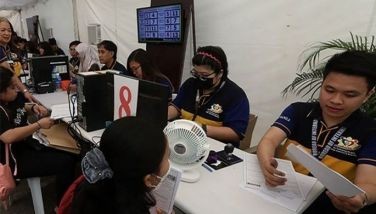Co-teaching the Filipino youth

You can’t blame mothers nowadays if they think that Teodora Alonzo playing the role of first teacher to her son Jose Rizal has been too romanticized. Mothers have never been more stressed (if not toxic) since their student days, and fathers – well, they just don’t have the tenacity for it, or vice versa by exception. One thing is for sure: parents, willingly or otherwise, have become hard working partners of teachers (but without honorariums, that is). And the parent has become a learner along with the student child they’re trying to teach.
Say what you will, but from what we have observed, the government has done its fair share to make home school learning work for everyone, transferees from private schools and kids without connectivity included. The modules picked up from school have good content, and public school teachers settled in their roles quite quickly as guides of parents, and instructors of students even without facetime.
The granular birth pains and the cat-and-mouse games that came along with the novelty of studying from home were interesting. The focus of this article this Sunday however, is rather an area considered very important by many countries and global organizations. It is soft skills training: communication, critical thinking, creativity, social skills, work ethic, leadership. If our educational system is found wanting on training students sufficiently in this area pre-pandemic, it is going to be worse now unless there is intervention.
As early as 2015, a World Bank study showed that the lack of socio-emotional skills in Filipino workers affected their employability. In fact, Philippine firms reported that applicants don’t get hired because they lacked managerial and leadership skills, work ethic and commitment, interpersonal and communication skills, and that workers with adequate soft skills were the hardest to find.
The truth is, the mismatch between the course a graduate studied for and his actual occupation once employed is not only a function of oversupply. To give you an idea, according to Philippine Industrial Development Studies (PIDS) data for 2019, 47 percent of nursing graduates did not end up as nurses, 53 percent of civil engineering graduates landed unrelated jobs, and 74 percent of accountancy graduates did not work as accountants. Overall, almost half of the graduates who have taken courses required by the Professional Regulation Commission and are employed during the reference period are in jobs that do not match their degrees.
It is not necessarily due to the lack of opportunity in their career of choice, but their employability has been negatively impacted by their lack of soft skills. This is telling because we always proceed from the assumption that it is an issue of supply by the academe not matching the demands of the industry. In a way, it is. Industry demands not only the technically sufficient, but holistically competent, person.
One thing we’ve observed is that children’s primary instruction materials in public schools are in the vernacular. So children in Bicol will have their materials in Bicolano, those in Cebu will have theirs Cebuano, and so on. Don’t get me wrong; I recognize people are proud of their heritage. But with all due respect, this primary medium of instruction in public schools during their very formative years gives them a handicap. The business language and the international language, as we all know, is English.
As one hands-on in training our people, I know for a fact that if the English language issues of a person are not cured in high school (and it is tough to cure it in high school if elementary training is not there), the grammatical defects and erratic constructions will persist until they are already working.
Do you remember the Philippines placing last among 79 countries that participated in the Programme for International Student Assessment (PISA) in 2018? It’s because we scored poorly in math, science, and reading comprehension. The test materials are in English. So our children should not be quarantined to their dialects. They should have good command of the English language, as young as possible.
On work ethic, I am afraid to say that so much relies on what children see. Now that parents are teaching their kids directly, and if they give up, so would their kids. Their role modelling starts here.
Social skills and empathy are big ticket items. The depression and suicide stats in the Philippines during the pandemic is a wake-up call that this thing is real. Modules should be developed side by side with psychologists for effective materials and methods in a virtual setting.
Case studies and virtual role plays should also be developed to teach students how to lead. Classroom (or home class) policy should be made to encourage students to challenge their teachers (or parents, for that matter) if they must, to practice critical thinking even at a young age.
I can’t help but recall the news the other day about Vietnam surpassing the Philippines this year in per capita income because of the way they handled the pandemic. They handled it so well that they avoided recession and even managed growth. I segue into something that they exhibit better than us, in my opinion. It’s discipline.
Cultural change is hard but possible. The silver lining is, there is a new normal that is more accepting of change. “There is no bad student, only bad teacher” is a stretch. But a strong teacher-parent partnership can mold the right behavior in a teen or a child who’s like a sponge. Who knows, maybe the rest of the country will follow.
* * *
Alexander B. Cabrera is the chairman and senior partner of Isla Lipana & Co./PwC Philippines. He is the chairman of the Integrity Initiative, Inc. (II, Inc.), a non-profit organization that promotes common ethical and acceptable integrity standards. Email your comments and questions to [email protected]. This content is for general information purposes only, and should not be used as a substitute for consultation with professional advisors.
- Latest
- Trending






























